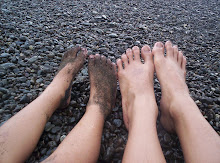Today is Ate Malou's 10th day in the Orthopedic Center. She is still waiting to be scheduled for surgery on her fractured leg.
A pin was surgically placed in her lower leg at the emergency room, but it took five days before her leg was put in a proper tibial traction because there was no available stirrup and frame for her leg, and the bed she was using had no frame.
The bed was in the hospital corridor, because there was no bed available inside the ward. She was transferred to the ward only on the sixth day, when a patient was discharged. The wards are badly overcrowded. The watchers play hide-and-seek with the nurses and the security guards, because the hospital has a very strict policy on watchers.
At night, some watchers sleep under their patients' beds. Most of them stay in a waiting area in the hospital's grounds, where they are paged if their patients need anything. They have large pieces of cardboard for their bed, and they cover themselves with blankets. If you arrived late, you can spread your cardboard on the sidewalk and use your luggage for a pillow. Some watchers beg on the streets around the hospital in the mornings. Their patients have been in the hospital for months, they came from faraway provinces, and they have no more money to even feed themselves.
There must be about sixty patients in the female ward. There is only one toilet for the watchers in the wards, and bath time is 6:00-8:00 am only. There is no kitchen, no source of hot water, no faucet for drinking water.
A caregiver goes around the ward on weekends. She charges P200 to give your patient a hair wash and a sponge bath. I was there on a Sunday afternoon, and I was surprised to see a woman peddling turon and banana cue along the corridor.
There is a Social Worker's office in the hospital, but even as they help with the paperwork, the patients are at the mercy of the funding agencies. It takes time. If we file for PCSO assistance, Ate Malou is looking at a six-month stay in the ward, waiting for funds to be released before any surgery can be scheduled.
It is difficult to get in touch with the doctors. The nurses tell you to just wait for the doctor's rounds, and they would not give the contact information of the doctor.
It is good if your patient has Philhealth and better if she was admitted at the charity ward. You can hope for a hospital bill that will not give you a heart attack upon discharge. If your patient has to wait, you have no choice. The expenses still mount.
After the surgery, you are expected to go back for follow-up consultations in the Out-Patient Department. I have seen the queue. The lines snake along the corridor, dozens upon dozens of them waiting. The people tell me we have to be there by 4:00 am to make sure you get a slot. Otherwise, you come back on the following day.
We had been advised to get the blood and the implant ready, and they would schedule her for surgery. We were ready by Monday morning, 4 February. Today is 11 February, and we are still waiting. I spoke to the doctor this morning. Hopefully, they can schedule her on the week of 18 February. Hopefully it pushes through. Hopefully her condition does not worsen. Hopefully she will not catch a cold or develop bedsores or get migraines in the hot ward; otherwise, she gets postponed. It is hard to sustain yourself on hope, at the mercy of the public hospital system.
The hospital personnel try to be kind, but they manage to convey an unkind message: you are in a public hospital. You are on queue. You wait. In the meantime you deplete your funds, your patient remains in pain, and treatment gets delayed. In the words of a well-meaning (probably) staff, my patient doesn't look like she's dying, so we're not a priority.
Such is the condition in a public hospital like the Orthopedic Center. Public hospitals are the providers of last resort for those in need of health care. They do not refuse care, but you must be very patient, and in many instances you have to forget your dignity.
The government's first PPP (Public-Private Partnership) project in health is the modernization of the Orthopedic Center, and the pre-bid conference has already taken place. They new Orthopedic Center will have 700 beds, with 70% of the beds for use of Philhealth members and indigents. It will have state-of-the-art facilities. Let's hope it succeeds. Let's hope the social welfare system is in place. Let's hope that there is a mechanism to provide trained health care professionals, and appropriate technology in a setting where the individual patient cannot afford the true cost of such technology.
In the meantime it is very frustrating to wait, and even more frustrating to realize that you are powerless to insist. I left a note--in English-- on Ate Malou's bed, in the nurses' station, and in the OPD section (that one was refused) on 4 February, the day I couldn't find the doctor. All I was asking for was that they let the doctor know that Ate Malou was ready for surgery. They made fun of that note. I am told that hospital staff who saw the note asked Ate Malou who wrote it, and why it was in English. Maybe they thought the note was arrogant.
I could have told them that not everyone who is a patient at the charity ward of a public hospital is uneducated, and not everyone who speaks English has money. Ate Malou is in Orthopedic Center because we cannot afford St. Luke's. But it doesn't mean we cannot speak out, or request to be accommodated, or expect to be treated decently.
Monday, February 11, 2013
Subscribe to:
Post Comments (Atom)





















No comments:
Post a Comment